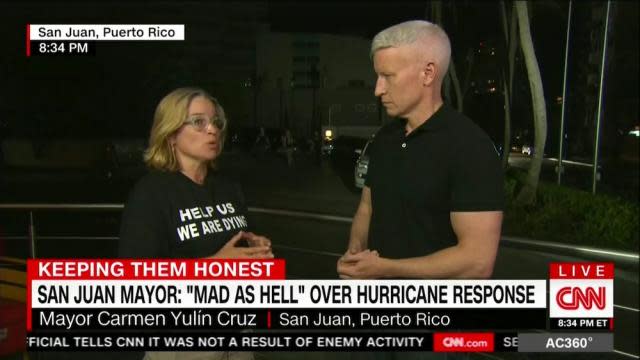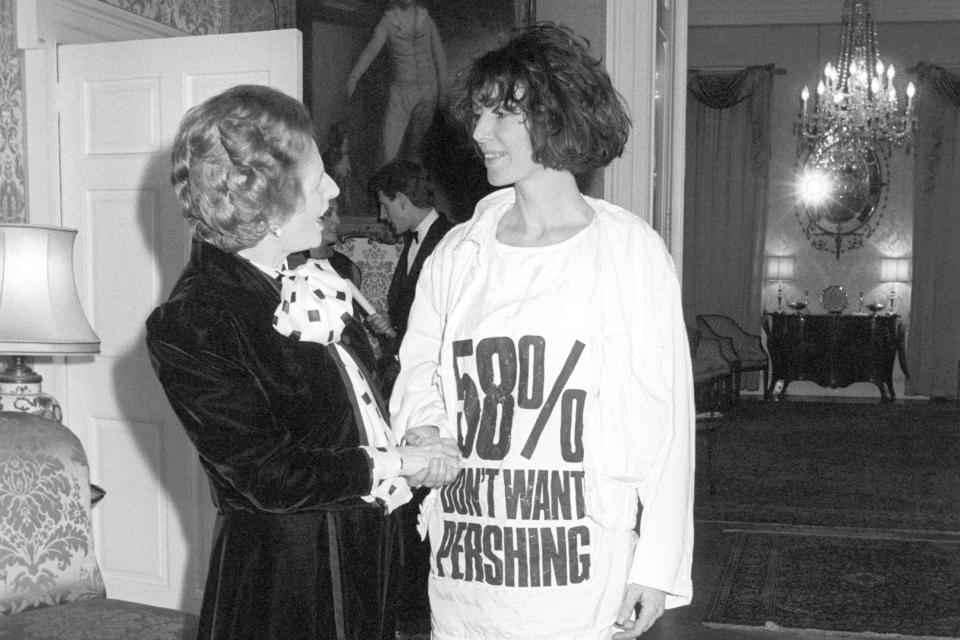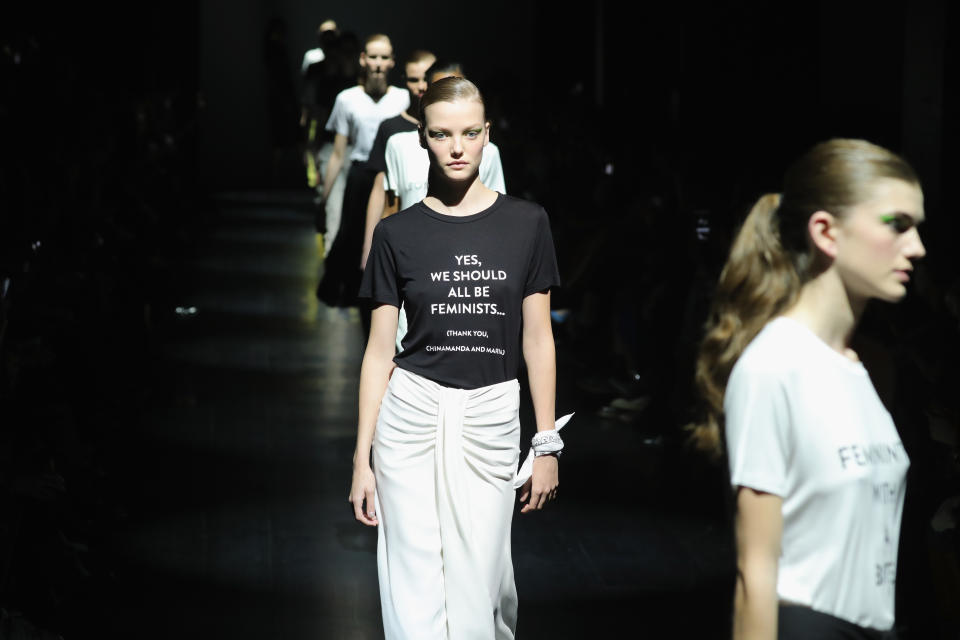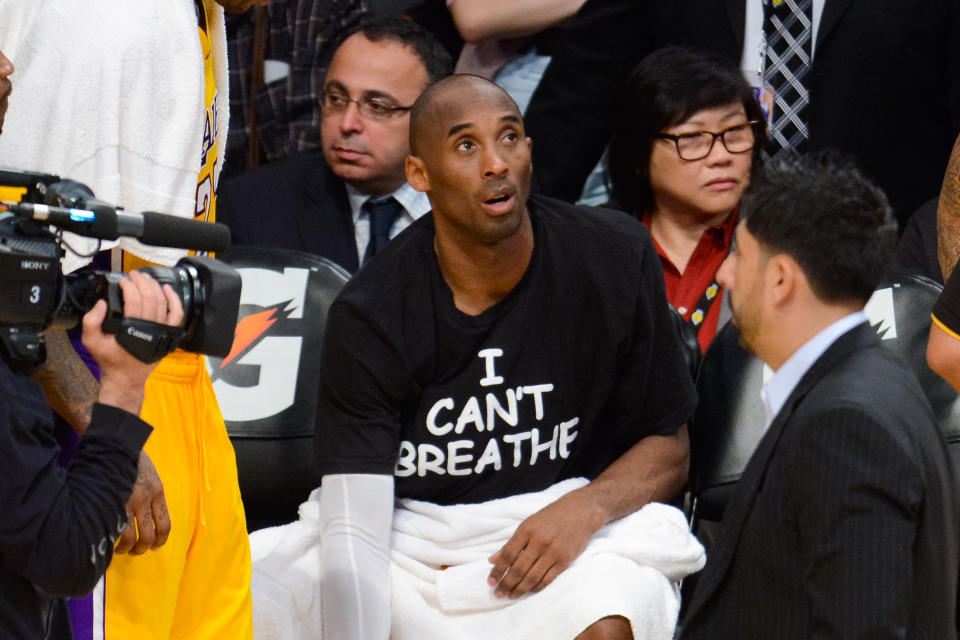Slogan T-shirts as a powerful political tool: 'Help Us We Are Dying'
When Carmen Yulín Cruz, the mayor of San Juan, Puerto Rico, went on CNN Friday night, she wore a black T-shirt with white writing. In all caps, her T-shirt read, “Help Us We Are Dying.”

Her shirt was a direct rebuke to acting Homeland Security Secretary Elaine Duke, who called the government’s response to the Hurricane Maria aftermath in Puerto Rico a “good news story.” To that, Cruz said Friday morning on CNN, “When you’re drinking from a creek, it’s not a good news story. When you don’t have food for a baby, it’s not a good news story. Dammit, this is not a good news story. This is a people-are-dying story.”
The shirt she wore later in the day served to reiterate that point; it was a powerful way of reclaiming her narrative: “Help us, we are dying.”
Speaking with @andersoncooper, San Juan mayor is wearing a T-shirt that says “HELP US, WE ARE DYING” pic.twitter.com/qcKTTCANdP
— Brian Stelter (@brianstelter) September 30, 2017
In the interview on CNN, Cruz re-emphasized the message on her shirt, “I will do what I never thought I was going to do,” she said. “I am begging, begging anyone who can hear us to save us from dying. If anybody out there is listening to us, we are dying, and you are killing us with the inefficiency.” With her voice being repeatedly blocked out and spoken, over she made herself heard.
Reality star Bethenny Frankel, who chartered a plane to Puerto Rico filled with supplies, also wore a T-shirt that spoke her mind. It read: #thisisacrisis.
A post shared by Bethenny Frankel (@bethennyfrankel) on Oct 2, 2017 at 4:58pm PDT
She wore the same T-shirt in Mexico after the devastating earthquake.
A post shared by Bethenny Frankel (@bethennyfrankel) on Sep 24, 2017 at 7:07am PDT
And also in Texas after Hurricane Harvey.
A post shared by Bethenny Frankel (@bethennyfrankel) on Sep 13, 2017 at 2:26pm PDT
The proceeds from the shirt — which is made by B Strong, a joint venture between Frankel and the not-for-profit organization Dress for Success — go entirely to women who are victims of these disasters.
Slogan T-shirts are a powerful political tool. They instantly say something that the wearer wants to convey, and in the Instagram-obsessed world, they provide messages that are easily shared, reposted, understood. They are often simple, using a solid background with letters in bold contrasting colors. Easy to read. Easy to see. Easy to understand.
These types of T-shirts first became popular in the ’80s when designers such as Katharine Hamnett and Vivienne Westwood emblazoned high-fashion tees with messages. While meeting with then-British Prime Minister Margaret Thatcher, Hamnett famously wore a slogan T-shirt that read, “58% Don’t Want Pershing” (a protest of a proposed missile site in the U.K.). “That T-shirt gave me a voice,” Hamnett told the Guardian in 2009.

In the last year or so, as global political frustrations have risen, slogan T-shirts have become massively popular again. Nigerian writer Chimamanda Ngozi Adichie’s words are emblazoned across Christian Dior T-shirts that read, “We Should All Be Feminists.” Christian Siriano makes shirts that read, “People Are People.” And Prabal Gurung filled his Fall 2017 fashion show finale with T-shirt clad models, their slogans reading, “Yes, We Should All Be Feminists (Thank You, Chimamanda and Maria),” “Revolution Has No Borders,” “I Am an Immigrant,” and “The Future Is Female.”

NBA players made waves in 2014 when entire teams did pregame warm-ups in T-shirts reading “I Can’t Breathe.” The slogan referenced the last words spoken by Eric Garner before he died due to a chokehold administered by the police officer arresting him.

Slogan T-shirts have power — they can show allegiance, drum up support, and raise awareness. In the case of Frankel’s shirt, they can be used to raise money and to help those in need. And in the case of San Juan’s mayor Cruz, they can serve as a powerful political tool and an instant form of expression.
While the federal government tried to downplay the crisis in Puerto Rico, Cruz wore it emblazoned across her chest. If her spoken words were getting lost or twisted in the politics and media din, Cruz made sure that she got to say what she needed to say. Saying it with a T-shirt finally helped her to get heard.
Read more from Yahoo Lifestyle:
Why the federal 20-week abortion ban is up for a vote — again
Tiffany Trump slammed for ‘tone-deaf’ quote amid Puerto Rico crisis
How schools are dealing with students taking a knee during the national anthem
Follow us on Instagram, Facebook, and Twitter for nonstop inspiration delivered fresh to your feed, every day.



